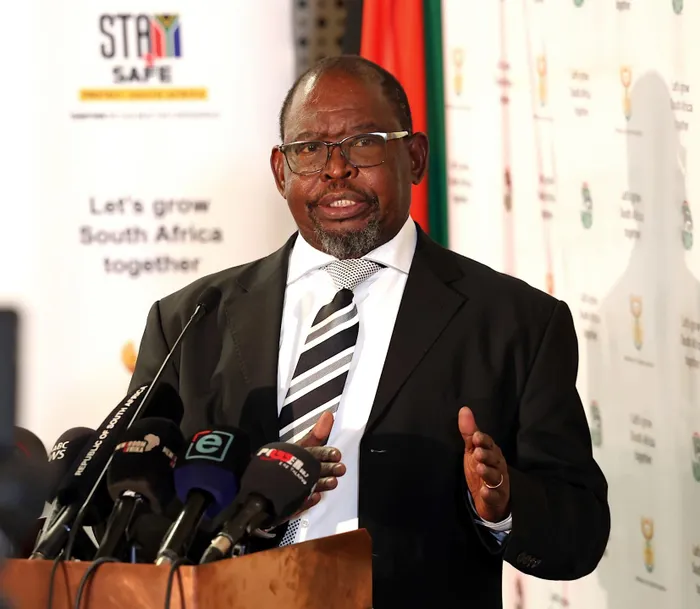South Africa's Budget Speech Set for 21 May: Key Insights from Finance Minister Godongwana

Finance Minister Enoch Godongwana announced on Wednesday in a media briefing that the third Budget speech will take place on 21 May.
Image: Picture supplied
Finance Minister Enoch Godongwana announced on Wednesday in a media briefing that the third Budget speech will take place on 21 May.
The announcement comes following the 0.5 VAT reversal announced last week by the Treasury, which was proposed in the March 2025 Budget and the matter being taken to court by the Democratic Alliance (DA) and Economic Freedom Fighters (EFF).
Minister Godongwana also announced that he and the Treasury would not be taking any questions regarding the preparation of the third budget speech until 21 May.
Godongwana said that the Budget of 12 March 2025 and the proposed VAT increase sparked rigorous debate.
“This is welcomed in a healthy democracy. Today there is clarity that VAT will remain at 15%. This decision was shaped not only by political debate but by the voices of the South African people.”
Godongwana added that we are all new in South Africa to what is called coalition politics. “There are lessons to be learnt by cabinet, legislature and ourselves. I'm pleased that we have agreed that we will balance the budget without raising VAT while protecting vital sectors such as education, health, and social grants.”
Godongwana said that the National Treasury has already commenced work on developing a new fiscal framework that will maintain their trajectory toward debt stabilisation, a crucial element in strengthening our public finances.
“The revised budget will adhere to all established technical processes and consultations as set out in the Money Bills and Related Matters Act. This includes formal consultations with the Financial and Fiscal Commission, thorough consultations with all political parties within the Government of National Unity (GNU), as well as Cabinet approval before presentation to Parliament.”
Godongwana added that this comprehensive review will include the Fiscal Framework, the Appropriation Bill, Division of Revenue Bill, and the already tabled Rates and Monetary Amounts and Amendment of Revenue Laws Bill.
“Until the new budget is passed, government services will continue to be funded under section 29 of the Public Finance Management Act. This allows spending of up to 45 per cent of last year’s budget during the first four months, and up to 10 per cent for each month after that.”
Godongwana said that while we wait for the 2025 Division of Revenue Act to be passed, funding for provinces and municipalities will continue under the 2024 Act, allowing transfers of up to 45 per cent of their allocated funds. “While the postponement of the budget's passage is not ideal, the circumstances leading to this decision have highlighted the importance of meaningful engagement on fiscal matters.”
Godongwana added that this situation has provided a valuable opportunity for all stakeholders—citizens, Members of Parliament, labour organisations, and civil society—to thoroughly engage with the complex challenge of achieving fiscal sustainability while promoting economic growth and protecting essential public services within very limited resources.
Godongwana said that the revised process includes:
- Revising economic assumptions using the latest available data
- Generating updated fiscal projections
- Recalculating revenue projections and tax implications
- Determining appropriate borrowing strategies
- Consolidating these elements into a coherent and sustainable fiscal framework.
Godongwana added that they will soon develop a new consultation process for the Budget speech to accommodate the GNU. “This process will start in September before the Medium-Term Budget Policy Statement (MTBPS). The MTBS is a key milestone as it shapes the content of the February budget.”
Professor Andre Thomashausen, a renowned expert in international law from the University of South Africa, said that the survival of the GNU is crucial to safeguarding South Africa's reputation as a reliable trading partner and safe investment destination.
“The VAT compromise is a small price to pay for giving the GNU a longer chance to fix the many governance issues that the GNU inherited. It is positive that the VAT debate has now encouraged a more rigorous engagement to combat corruption and the wasting of funds in the upkeep of mismanaged State Owned Enterprises.”
Johann Els, Old Mutual Group chief economist, said that the cancellation of the VAT rate increase has created a R75 billion funding gap over the next three years, putting pressure on the Treasury to maintain its fiscal consolidation targets. “These include narrowing the budget deficit from -5.0% to -4.6%, raising the primary surplus from +0.5% to +0.9%, and peaking the debt-to-GDP ratio at 76.2% this year.”
Els added that with limited scope for new tax hikes, the focus must now shift to spending cuts, likely reversing some of the increases announced in previous budgets.
“Additional revenue measures—such as a potential large fuel levy hike—may also be introduced to plug the gap. Failure to stay on track would raise red flags for investors and ratings agencies.”
BUSINESS REPORT